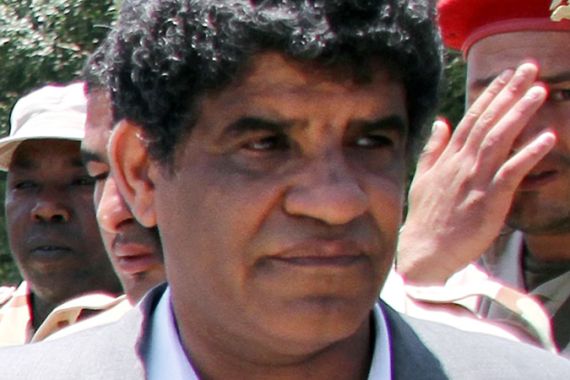Gaddafi’s fugitive former spy chief arrested
Abdullah al-Senussi captured in southern desert near where Gaddafi’s son was also seized, Libyan officials confirm.

Muammar Gaddafi’s intelligence chief, wanted internationally on charges of crimes against humanity and the last major fugitive at large after the fall of the former Libyan leader, has been arrested, according to the National Transitional Council (NTC).
Abdullah al-Senussi was captured in Libya’s southern desert, near where Saif al-Islam, Gaddafi’s son and one-time heir apparent was seized a day earlier, Mahmoud Shammam, Libya’s information minister, told reporters in Tripoli on Sunday.
The International Criminal Court (ICC) issued arrest warrants on June 27 for Saif al-Islam, Gaddafi and Senussi on charges of crimes against humanity committed while crushing anti-regime protests earlier this year.
Senussi’s capture was earlier announced by an officer in the eastern city of Benghazi as NTC officials were meeting with the military.
“The terrorist, the assassin, Abdullah al-Senussi has been arrested,” said the officer to thunderous applause.
Jallal al-Digheily, Libya’s defence minister, who was at the meeting with hundreds of army officers, branded the capture a “victory”. A member of the Thwar Council (revolutionary council) in Tripoli also confirmed the arrest.
Senussi, 62, is the brother-in-law and former right-hand man of Gaddafi, who was killed in circumstances still under investigation last month.
In 1999, a Paris court sentenced Senussi in absentia to life in prison for his alleged involvement in an attack on a French UTA airliner a decade earlier that killed 170 people.
ICC challenge
Libya stood firm on Sunday over the trial of Saif al-Islam, saying its courts could judge him fairly, defying the ICC, which says it is its right try him at The Hague.
As news came in of the capture of al-Senussi, officials said he, too, would be given a fair trial in Libya.
“The Libyan judicial system is capable of prosecuting people of Saif’s stature,” said Mohammed al-Alagi, Libya’s interim justice minister.
“The important thing is to ensure a fair trial. We have been preparing for this for months.”
The ICC is only supposed to try cases which nation states are unwilling or unable to prosecute, and here it is the strength of Libya’s judicial system that is in doubt.
Many observers says that after Gaddafi spent four decades hollowing out Libya’s public institutions, the judiciary can not handle cases as sensitive and complex as these, least of all in the poisoned atmosphere that follows an uprising.
“It has no viable judicial system. Any system that existed was deliberately eradicated over four decades,” said Richard Dicker, international law expert at Human Rights Watch.
Like many countries, Libya does not have the offence of crimes against humanity on its statute books.
In a state that needs to be rebuilt from the ground up, there are also obvious concerns about security and the rule of law generally.
A UN Security Council resolution passed in February in response to the crackdown on protesters imposes a duty on the Libyan authorities to cooperate with the ICC. The court says that Libya must either hand over the former leaders or obtain the ICC’s permission to hold a trial in Libya.